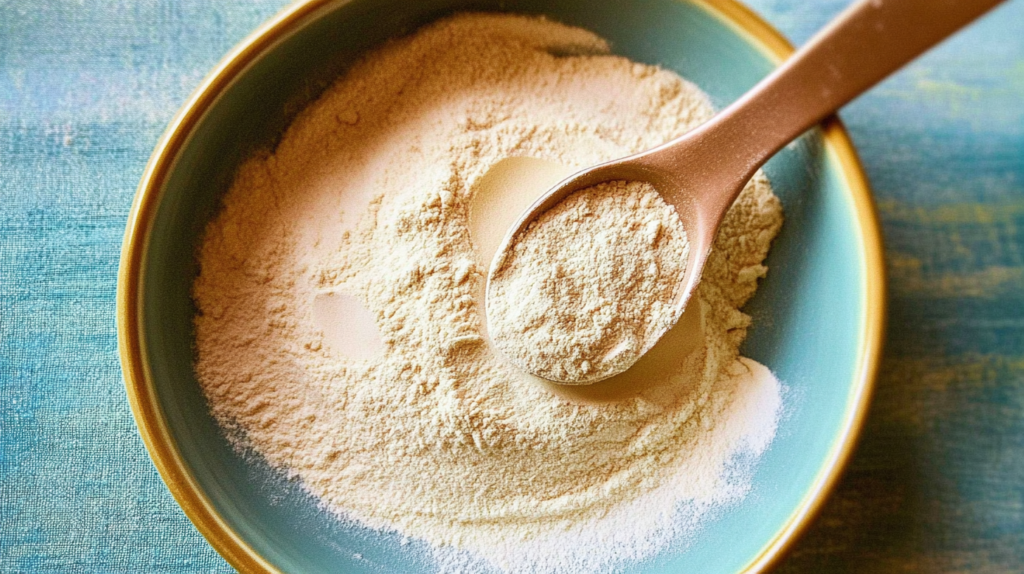Whey protein is one of the most popular supplements among athletes, fitness enthusiasts, and people looking to improve their protein intake. However, if you have celiac disease, gluten intolerance, or simply follow a gluten-free diet, you might be wondering: Is whey gluten free?
The short answer is yes, pure whey protein is naturally gluten-free. But the real concern lies in processing, added ingredients, and potential cross-contamination. In this article, we’ll explore everything you need to know about whey and gluten, from how whey is made to how you can ensure you’re choosing a safe, gluten-free protein supplement.
Table of Contents
Understanding Whey Protein
Before diving into the gluten-free aspect, it’s essential to understand what whey protein is and how it’s produced.
What Is Whey Protein?
Whey protein is a high-quality protein derived from milk during the cheese-making process. When milk is curdled, it separates into two main components:
- Curds – which are used to make cheese.
- Whey – the liquid that remains after curds are removed.
This liquid whey is processed and dried into a powdered protein supplement that is widely used in shakes, protein bars, and meal replacements.
How Is Whey Protein Made?
The process of making whey protein involves:
- Separation – Milk is curdled to extract whey from curds.
- Filtration – Whey is filtered to remove fats and lactose.
- Drying – The liquid whey is dried into powder form.
This production method ensures that pure whey does not naturally contain gluten unless additives are introduced during processing.
Types of Whey Protein
There are three main types of whey protein, each with different processing levels:
- Whey Protein Concentrate (WPC): Contains some fats and carbohydrates, including a small amount of lactose.
- Whey Protein Isolate (WPI): Further processed to remove most fats and lactose, making it a purer protein source.
- Whey Protein Hydrolysate (WPH): Pre-digested for faster absorption and commonly used in medical protein supplements.
Since gluten is not naturally present in dairy, whey protein, in its purest form, is considered gluten-free. However, certain processing methods may introduce gluten.
Understanding Gluten
To better assess whether whey is gluten-free, it’s important to understand what gluten is and why it matters.
What Is Gluten?
Gluten is a group of proteins found in certain grains, primarily:
- Wheat
- Barley
- Rye
- Triticale (a wheat-rye hybrid)
It gives dough its elasticity and helps baked goods maintain their shape. While gluten is harmless for most people, it can cause severe health issues for individuals with celiac disease or gluten sensitivity.
Sources of Gluten in Foods
Gluten is commonly found in:
- Bread, pasta, and baked goods
- Cereals and granola
- Processed foods and sauces (such as soy sauce)
- Beer and malt beverages
Who Needs to Avoid Gluten?
- People with Celiac Disease: An autoimmune disorder where gluten triggers damage to the small intestine.
- Individuals with Non-Celiac Gluten Sensitivity (NCGS): Experience symptoms like bloating and fatigue but do not have an autoimmune reaction.
- Those Following a Gluten-Free Diet by Choice: Some people choose to eliminate gluten for dietary preferences or other health reasons.
Now that we understand whey and gluten separately, let’s address the main question: Is whey gluten-free?
Is Whey Gluten Free?

Now that we understand what whey protein and gluten are, let’s answer the main question: Is whey gluten free?
Does Pure Whey Contain Gluten?
Yes, pure whey protein is naturally gluten-free because it comes from milk, which does not contain gluten. However, many commercial whey protein powders may not be entirely gluten-free due to added ingredients, cross-contamination, or manufacturing processes.
When Whey Protein Might Contain Gluten
While whey itself does not contain gluten, some factors can introduce gluten into whey protein supplements:
- Cross-Contamination During Processing
- Whey protein is often processed in facilities that also handle wheat, barley, or rye-based ingredients.
- Shared equipment and storage areas can result in small traces of gluten mixing with whey.
- Added Ingredients
- Some protein powders include flavorings, thickeners, or stabilizers that contain gluten.
- Malt, a common flavoring agent, is derived from barley and contains gluten.
- Mixing with Other Protein Sources
- Some supplements mix whey with plant-based or grain-derived proteins that may contain gluten.
- Protein bars and meal replacements may include gluten-based fillers.
How to Identify Gluten-Free Whey Protein
If you have celiac disease or gluten sensitivity, it’s important to ensure your whey protein is 100% gluten-free. Here’s how:
- Check for a Certified Gluten-Free Label
- Look for labels that say “Certified Gluten-Free” from trusted organizations like the Gluten-Free Certification Organization (GFCO) or the Celiac Support Association (CSA).
- The FDA considers products with less than 20 ppm (parts per million) of gluten as gluten-free, but certified gluten-free products go through stricter testing.
- Read the Ingredient List Carefully
- Avoid ingredients like malt extract, wheat protein, or barley-based flavoring.
- Choose whey protein that lists minimal ingredients (e.g., whey protein isolate, natural flavors, stevia).
- Research the Brand’s Manufacturing Practices
- Visit the brand’s website or contact customer support to ask if their whey protein is processed in a gluten-free facility.
- Some brands clearly state if they test for gluten cross-contamination.
Benefits of Gluten-Free Whey Protein
If you choose a gluten-free whey protein, you can enjoy several health benefits:
1. Safe for Gluten-Intolerant Individuals
- People with celiac disease or gluten sensitivity can safely consume certified gluten-free whey protein.
- Avoids triggering symptoms like bloating, fatigue, or digestive distress.
2. High-Quality Protein Source
- Whey protein is a complete protein, meaning it contains all nine essential amino acids that the body needs.
- Ideal for muscle repair, immune function, and overall health.
3. Supports Muscle Growth and Recovery
- Whey protein is rapidly absorbed, making it an excellent choice post-workout.
- Helps with muscle synthesis and recovery after intense exercise.
4. Low in Lactose (Especially Whey Isolate)
- Whey protein isolate has very little lactose, making it easier to digest for those with mild lactose intolerance.
- Always check if the product is both gluten-free and lactose-free if you have multiple dietary restrictions.
How to Choose a Safe Gluten-Free Whey Protein

If you need a gluten-free whey protein, choosing the right product is crucial. Not all whey protein powders are truly gluten-free, so here’s how to find a safe option.
1. Check for a Certified Gluten-Free Label
A certified gluten-free label is the best way to ensure a product is safe. Look for certification from trusted organizations like:
- Gluten-Free Certification Organization (GFCO)
- Celiac Support Association (CSA)
- FDA Gluten-Free Label (less than 20 ppm of gluten)
This ensures the product has been tested and meets strict gluten-free standards.
2. Read the Ingredient List
Always check the label for hidden gluten-containing ingredients, such as:
- Malt extract or malt flavoring (from barley)
- Modified food starch (if not specified as gluten-free)
- Hydrolyzed wheat protein
- Barley enzymes or artificial flavorings
For a truly gluten-free option, choose a product with minimal ingredients, like:
✅ Whey protein isolate
✅ Natural sweeteners (e.g., stevia)
✅ Cocoa powder (for chocolate flavors)
3. Research the Brand’s Manufacturing Practices
Some companies process whey in facilities that also handle gluten-containing products, leading to cross-contamination. To avoid this:
- Visit the manufacturer’s website and look for gluten-free statements.
- Contact customer support if unsure.
- Choose brands that specifically test for gluten contamination.
4. Avoid Blended Protein Powders
Some protein powders mix whey with plant-based or grain-derived proteins, which may contain gluten. If you are unsure, stick to 100% whey protein isolate.
5. Choose Trusted Gluten-Free Whey Brands
Some brands are known for producing high-quality, gluten-free whey protein. These include:
- Optimum Nutrition Gold Standard Whey (Gluten-Free Certified)
- Dymatize ISO100 Whey Isolate
- MuscleTech NitroTech Whey Protein
- Isopure Zero Carb Whey Protein
Always double-check the latest labels, as manufacturing processes can change.
Alternatives to Whey Protein for Gluten-Free Diets
If you need a gluten-free and dairy-free protein powder, there are great alternatives to whey protein.
1. Plant-Based Protein Options
Plant-based proteins are naturally gluten-free and ideal for those with lactose intolerance or dairy allergies. Popular options include:
- Pea protein – High in protein and easily digestible.
- Brown rice protein – Gluten-free, but check for cross-contamination.
- Hemp protein – Rich in omega-3s but lower in protein content.
- Soy protein – A complete protein, but some people may be allergic.
2. Other Animal-Based Protein Powders
If you prefer an animal-based protein without whey, consider:
- Egg white protein – High in protein and naturally gluten-free.
- Collagen protein – Great for skin and joint health, but lacks complete amino acids.
Both options are safe for gluten-free diets as long as they are not processed with gluten-containing ingredients.
FAQs About Whey and Gluten
1. Can People with Celiac Disease Consume Whey?
✅ Yes, but only if it is certified gluten-free. Pure whey protein does not contain gluten, but cross-contamination in processing facilities can be a risk. If you’re also concerned about other pantry staples, you might find it helpful to check out Is Peanut Butter Gluten-Free? to ensure your protein-packed snacks are safe.
2. Are Most Protein Powders Gluten-Free?
🔸 Not necessarily. Some protein powders contain gluten-based additives or may be cross-contaminated. Always check for gluten-free labels. If you’re looking for more safe gluten-free foods, consider reading Are Grits Gluten-Free? to learn about grain alternatives.
3. What Are the Signs of Gluten Contamination?
If you have celiac disease or gluten sensitivity, consuming gluten-contaminated whey protein may cause:
- Digestive issues (bloating, gas, diarrhea)
- Fatigue and brain fog
- Skin rashes or inflammation
If you suspect gluten contamination, switch to a certified gluten-free protein.
4. How Can I Test for Gluten in Whey Protein?
🔹 Some home test kits, like GlutenTox or Nima Sensor, can detect gluten in food and supplements. However, the best approach is to choose a certified gluten-free whey protein. Looking for more gluten-free meal inspiration? Check out Gluten-Free Dinner Recipes for ideas on how to include your whey protein in daily meals.
5. Are There Any Dairy-Free and Gluten-Free Protein Options?
Yes! If you need both gluten-free and dairy-free protein, try:
- Pea protein
- Hemp protein
- Egg white protein
- Collagen protein
These are naturally gluten-free and suitable for lactose-intolerant individuals.
Conclusion
So, is whey gluten-free? Yes, pure whey protein does not contain gluten. However, the real concern is cross-contamination and added ingredients in some protein powders. If you follow a gluten-free diet, make sure to:
✔️ Choose a certified gluten-free whey protein
✔️ Read labels carefully to avoid hidden gluten
✔️ Pick reputable brands that test for gluten contamination
By following these tips, you can enjoy the benefits of whey protein without the risk of gluten exposure.

